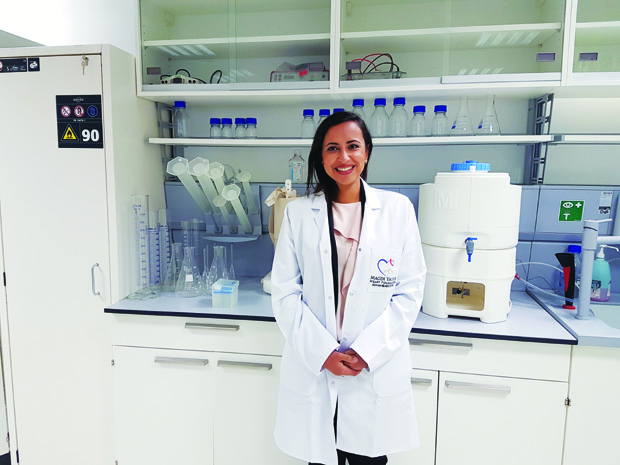The Magdi Yacoub Heart Foundation recently opened a new research center in Aswan dedicated to studying heart disease and treating patients free of charge in a region that has long suffered from neglect. More importantly, the center aims to further understand the genome of the community so that doctors can offer personalised - and more effective - treatments to Egyptians.
by Ahmed Goher
“The whole world is upset about the fact that Africa and our region is lagging behind in this key area. We simply don’t know enough about our communities to be able to properly help them,” Magdi Yacoub, the foundation's founder, said. Through the latest genome sequencing technology, this information gap can be closed and new precision personalized treatments can be used, Yacoub said. Precision medicine is disease treatment and prevention that takes into account the patients' genes, environment, and lifestyle.
The new center can help in understanding the genome of the Egyptian people so that this new effective type of medicine can be deployed, Yacoub says. “Through this center and our young scientists who are busy researching the genome of our community, we will bring a great benefit to the world. This will not only help our people, but will also contribute to science because we find that a lot of the mutations and abnormalities in the genome occur here among our population. This will definitely add to the whole body of knowledge in this area.”
Knowing more about a person’s genetic composition can greatly enhance the effectiveness of drugs and treatment programs, Yacoub says.
[caption id="attachment_543632" align="alignnone" width="620"] The new research lab aims to crack the genome of the region’s communities to allow for personalized therapy.[/caption]
The new research lab aims to crack the genome of the region’s communities to allow for personalized therapy.[/caption]
The research center also boasts the software and hardware that churns out 3D models of certain parts of the heart that relay the organ’s function and structure. This allows doctors to properly plan and audit operations, Yacoub says, adding that the center also plans to explore stem cell biology and its application to patients in Egypt.
Such a center opening in Aswan is particularly important as the area has historically suffered from neglect and 67 percent of its population is poor, said Minister of Solidarity Ghada Wali at the opening. She praised the foundation for investing in young Egyptian doctors and for employing over 425 staff, conducting over 2,800 operations last year and diagnosing 13,000 cases.
In a country where heart disease claims over 210,000 people every year, according to the World Health Organization, the foundation has played a venerable role in treating some of the complex cases. All treatments are free of charge, and the selection of patients for treatment is based on the complexity of their cases.
The clearest sign of the foundation’s progress in Aswan is how it helps young people become some of the best doctors in the world, said Magdi Ishak, the head of the foundation’s board of executives. He gave the example of Yasmine and Heba Aguib, two sisters who studied in Munich and Berlin. Heba worked as a researcher at BMW, while Yasmine was Research Fellow and a scientific consultant to the head of the Technical University of Munich. Both decided to come back to Egypt to work with Yacoub on the research center.
“These youths leave such amazing places and positions and come work here for much lower benefits and salaries," Ishak said. "This shows the strength of their belief in the message of Dr. Magdi Yacoub and the research center."
The center's main focus is precision medicine and personalized therapy, Aguib says. "We want to know what exactly leads to symptoms and to provide tailored treatments that better guarantee less side-effects and higher rates of success,” she says, noting that the center aspires to be competitive on a global level and boasts a cutting-edge Research Centre with the latest in technological innovation. “You will have information on-site. We’ll be able to give this information to clinicians very quickly and our patients will strongly benefit from this effort," Aguib says. "At the same time we are continuously exchanging knowledge and expertise with the global research community and this is a very important reason behind signing the MOU with the Al Alfi Foundation.”
[caption id="attachment_543633" align="alignnone" width="620"] Yasmine Aguib[/caption]
Yasmine Aguib[/caption]
Sending students to travel and get acquainted with new ideas and technologies is very important, Aguib says, as every couple of months you have new and more efficient technologies and developments being discovered. The MOU with the Al Alfi Foundation “is definitely very important because it gives mobility to our young researchers. We are a research center and clinic and it is important that we have tight connections to universities and scientific bodies.”
The sponsorships provided by the Al Alfi Foundation for youths selected by the heart center do not have any conditionality. “Just by studying there they have already benefited patients. Experience shows students abroad are a pride for Egypt and for us, and they do usually return. We give them a very good environment here,” Yacoub said.
Read the full feature package on science in Egypt and the future in the November issue of Egypt Today.
Comments
Leave a Comment